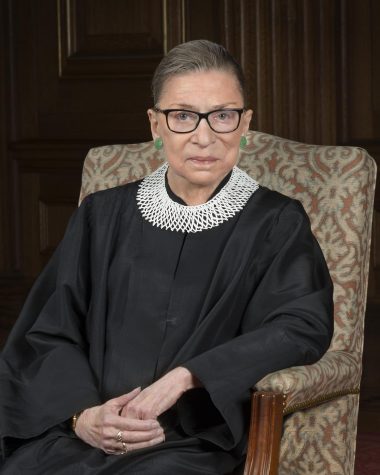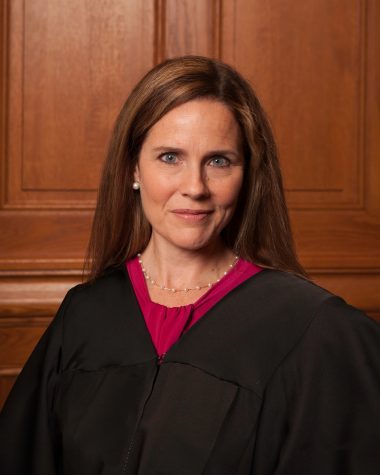Amy Coney Barrett is terrifying for the LGBTQ community
The White House from Washington, DC / Public domain
President Donald Trump nominated Amy Coney Barrett as Ruth Bader Ginsburg’s successor on Sept. 26.
September 30, 2020
President Trump’s list of potential Supreme Court nominees has been troublesome from the start for many activists. The list features a host of conservative, right wing judges which for many screams “this is the end of progress.” Now, with the passing of Supreme Court Justice Ruth Bader Ginsburg and the nomination of Amy Coney Barrett as her replacement, the reality of what this could mean has gone from troublesome to downright concerning in only a week.
As a queer person, I am worried about what this nomination could mean for the LGBTQ community, especially considering the amount of anti-LGBT legislation the Trump administration has pushed and plans to continue pushing. When I heard the news of Ginsburg’s death, I was heartbroken and was even more so when I learned that the Republican party was trying to fill her seat so quickly. The nomination of Barrett has only made my unease worse. When will my rights stop being the topic of debate? When will I get to stop being afraid of what my future might hold?
The woman Barrett will replace, the late Ginsburg, was an icon who paved the way for gender equality and fought tooth and nail against discrimination on the basis of sex. Justice Ginsburg also pioneered for LGBTQ rights. She embraced “fairness, justice and equality for all,” and she will be greatly missed. Knowing what her death would entail, Justice Ginsburg reportedly told her granddaughter that her “most fervent wish is that [she] will not be replaced until a new president is installed.”

However, that wish will not be granted. Senate Majority Leader Mitch McConnell and Pres. Trump will advance the Barrett nomination at warp speed despite the precedent that McConnell himself set four years ago: Pres. Obama tried to fill the seat of former Court Justice Antonin Scalia, but it was decided by the Republican party that since it was an election year, the seat should be filled by the next president. The precdent set by this was that this general rule would be followed in the future. Senator Lindsey Graham said it like this, “If there’s a Republican president in 2016 and a vacancy occurs in the last year of the first term, you can say Lindsey Graham said, ‘Let’s let the next president, whoever it might be, make that nomination,’ And you could use my words against me and you’d be absolutely right.”
Everyone to the left of Kim Jong-un has done just that on social media, but the outrage has fallen on tone-deaf ears. Republicans are now going back on their word, and a week after the death of Ginsburg and nearly six weeks before the election, they are pushing for the seat to be filled by election day. It seems like Graham has conveniently forgotten what he said four years ago, and is now quoted saying “we have this obligation, without delay!” in response to a Trump tweet that called for Ginsburg’s seat to be filled immediately.
The reasons for this call to action are loud and clear to everyone watching, the most obvious being the blatant power shift that will occur with a six to three right leaning Supreme Court. This in itself messes with the bipartisanship of the Supreme Court. Before the death of Ginsburg, the court was split five to four with conservative Chief Justice John Roberts siding with liberal justices on issues like abortion, immigration and LGBTQ rights. Replacing Ginsburg with Amy Coney Barrett would affect the dynamic of the Supreme Court for decades to come.
A more pressing reason for streamlining this decision deals with the election directly. President Trump has made it glaringly clear that he will challenge any decision made in November that does not declare him the winner, and it is most beneficial to him and the rest of the Republican party if he had a “decisive fifth justice on his side.” Another conservative seat would secure his favor even in a situation where the Chief Justice sides with the liberal justices.
Regardless of the ethics of replacing Ginsburg’s seat in the Supreme Court, Barrett is the antithesis to everything Ginsburg stood for.
The fear already existed that “[President Trump] may once again nominate people who would deny legal protections for LGBTQ people, take away the health care provided by the Affordable Care Act, undermine the fundamental right to vote, erode core civil rights laws and fail to value the lives, needs and Constitutional rights of the LGBTQ community,” and with the nomination of Barrett, many of those fears seem more and more real.

In a country where conversion therapy is only illegal in 20 of the 50 states, and the gay/trans panic defense is one allowable in court in all but eight states, it doesn’t take much to understand the fear and grief that many members of the LGBTQ community felt when Ginsburg passed. By 2010, she was the leader of the court’s liberal wing, and she consistently proved, time and time again, that she would never stop fighting for equal rights and fairness for all.
Throughout the Trump administration, queer people have watched nearly every Obama era regulation be undone to the point that many hate crimes can not be grouped under “discrimination on the basis of sex.” They are laws and regulations that threaten people’s lives, and they set an example that could be disastrous. When there are laws that suggest that a group of people are less than, society begins to view them as less than.
The fear is that Amy Barrett will follow the trend of religious conservatives in the past and place her own religious opinions above the beliefs of others. Beliefs should govern someone’s personal choices, but they should not be the factor that decides for everyone else.
The fear does not appear to be entirely unfounded. Early in her career, Barrett was “a law clerk and protégé” to former justice Antonin Scalia, “one of the most steadfast opponents of LGBTQ rights.” She questioned the role of the court in deciding Obergefell v. Hodges (the case that legalized gay marriage across the U.S.) and has claimed that Title IX protections do not extend to transgender Americans. Her track record doesn’t fare well with many members of the LGBTQ community.
A Supreme Court justice should be concerned with justice and equality for all regardless of their personal opinions and beliefs. A Supreme Court justice should be able to recognize the diversity of beliefs in the US, and make decisions that benefit everyone instead of decisions that only fit their idea of what is right.
This is a problem the LGBTQ community has faced for years. The ever present, “I don’t believe in it, so no one else should be allowed to believe in it.” It was one of the major arguments against the legalization of gay marriage; it’s a leading argument in the debate on whether or not child welfare organizations can deny an adoption to a gay couple. It is the reason for almost every debate against the LGBTQ community.
By filling Ginsburg’s seat on the Supreme Court with Barrett, we run the risk of completely overturning the balance essential to the operation of the Supreme Court, and we risk having a court whose majority opinion will violate the rights of many minority groups.
It is terrifying to think that one person’s opinion can be the deciding factor for entire groups of people. And, yes, opinions are worthy of respect, but that respect ceases to exist when an opinion disrespects someone’s existence. As a country, it seems we’ve forgotten that.
Editor’s note: The author of this piece asked for their name to be removed due to safety issues following their graduation.









